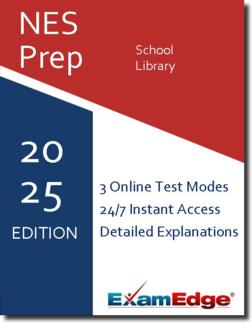NES School Library (502) Practice Tests & Test Prep by Exam Edge - Topics
Based on 29 Reviews
- Real Exam Simulation: Timed questions and matching content build comfort for your NES School Library test day.
- Instant, 24/7 Access: Web-based NES School Library Media Specialist practice exams with no software needed.
- Clear Explanations: Step-by-step answers and explanations for your NES exam to strengthen understanding.
- Boosted Confidence: Reduces anxiety and improves test-taking skills to ace your NES School Library Media Specialist (502).

Understanding the exact breakdown of the NES School Library Media Specialist test will help you know what to expect and how to most effectively prepare. The NES School Library Media Specialist has 150 multiple-choice questions The exam will be broken down into the sections below:
| NES School Library Media Specialist Exam Blueprint | ||
|---|---|---|
| Domain Name | % | Number of Questions |
| The Library Media Program | 30% | 45 |
| Promoting Information Literacy Skills | 40% | 60 |
| Program Administration | 30% | 45 |


